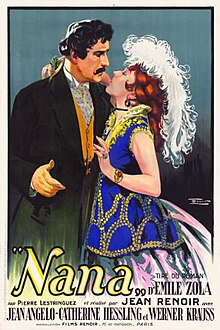Nana is a 1926 French silent drama film directed by Jean Renoir and starring Catherine Hessling, Werner Krauss and Jean Angelo. It was Renoir's second full-length film and is based on the 1880 novel by Émile Zola.
| Nana | |
|---|---|
 | |
| Directed by | Jean Renoir |
| Written by | |
| Produced by | Pierre Braunberger |
| Starring | |
| Cinematography | |
| Edited by | Jean Renoir |
| Music by | Maurice Jaubert |
Production company | Les Films Jean Renoir |
| Distributed by | Les Établissements Braunberger-Richebé |
Release date |
|
Running time | 150 minutes |
| Country | France |
| Language | French |
It was shot at the Bavaria Studios in Munich and the Neuilly Studios in Paris. The film's sets were designed by the art director Claude Autant-Lara.
Plot
editA government official, Count Muffat, falls under the spell of Nana, a young actress. She becomes his mistress, living in the sumptuous apartment which he provides for her. Instead of elevating herself to Muffat's level, however, Nana drags the poor man down to hers - in the end, both lives have been utterly destroyed.
Cast
edit- Catherine Hessling as Nana
- Werner Krauss as Count Muffat
- Jean Angelo as Count de Vandeuvres
- Raymond Guérin-Catelain as Georges Hugon
- Pierre Lestringuez as Bordenave
- Jacqueline Forzane as La Comtesse Sabine Muffat
- Claude Autant-Lara as Fauchery
- Pierre Champagne as Hector de la Faloise
- Karl Harbacher as Francis - le coiffeur
- Valeska Gert as Zoe - la femme de chambre
- Jacqueline Ford as Rose Mignon
- Dennis Price as Le jockey de 'Nana'
- Gresham as Le jockey de 'Lusignan'
- Luc Dartagnan as Maréchal - le bookmaker
- Nita Romani as Satin
- Roberto Pla as Bosc
- Gorieux as Le médecin
Production
editThe film stars Renoir's wife, Catherine Hessling, in an eccentric performance as the flawed heroine Nana.
Jean Renoir's film is a somewhat truncated adaptation of Émile Zola's classic novel. The film's extravagances include two magnificent set pieces – a horse race and an open air ball. The film never made a profit, and the commercial failure of the film robbed Renoir of the opportunity to make such an ambitious film again for several years.
References
editExternal links
edit